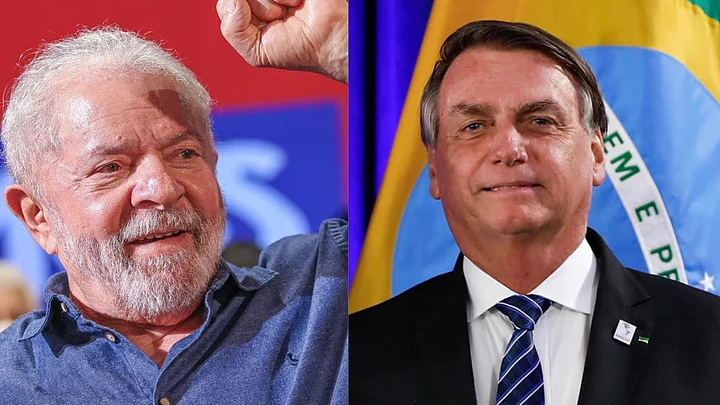Brazil is set to witness one of the most polarising elections in its recent history on Sunday, 2 October, with the incumbent, Jair Bolsonaro, squaring off against his arch-rival and former president Luiz Inácio Lula da Silva, known across the country as 'Lula'.
While 11 candidates are in the fray, only Bolsonaro and Lula have a chance of winning, as per almost every pollster in the country.
While Lula – a leftist icon who led the country from 2003 to 2010 – has been leading in the polls owing to massive anti-incumbency against the far-right president, a last-minute swing cannot be ruled out just yet.
Further, some polls suggest that Bolsonaro has been closing the gap between himself and his 76-year-old rival – which could lead to a nail-biting finish.
If Lula wins, however, Brazil could see the return of a left-wing government after years.
The Incumbent: Who Is Bolsonaro?
Bolsonaro, a former military officer, has openly expressed his support for the two-decade-long brutal dictatorship in Brazil.
A Congressman since 1991, he has been known for making derogatory and offensive remarks, especially against indigenous people, negroes, women, migrants, and members of the LGBTQ community.
He had also slammed the country's Supreme Court after it ruled to criminalise homophobia and make it a crime equivalent to racism.
In around three decades of being in politics, Bolsonaro put forth over 170 bills in Congress, only two of which became laws.
In January 2018, he left the Social Christian Party and moved to the Social Liberal Party, following which the latter started to develop a more conservative approach to politics.
He also emerged as a candidate out of nowhere for the 2018 election in the country. In the backdrop of corruption allegations against Lula, he swept the election on the plank of promising to tide over recession in Brazil.
He was also stabbed while campaigning, a month before the election, and is considered to have received a large proportion of "sympathy votes."
His tenure, however, was marred by inadept handling of the pandemic and some environmental policies that drew condemnation from across the world, which included bringing about massive deforestation in the Amazon forest to boost economic growth.
The leader has made his angst against Lula well-known, calling him a "thief" and an "ex-jailbird" at many of his rallies.
The Challenger: Who Is Lula?
Lula has been banking on his experience, and highlighting the deficiencies of the Bolsonaro regime, especially his handling of the COVID-19 pandemic, which killed around 7 lakh people in the country, the economic downturn, and policies that triggered massive environmental degradation.
On the other hand, Bolsonaro has gone the Donald Trump way, casting a shadow over the validity and fairness of the electoral process.
The firebrand leader claimed that if he receives less than 60 percent of the total votes, then "something abnormal has happened," AP reported.
Lula's socialist roots extend to his humble beginnings, which forced him to quit schooling in the fourth grade and help his family financially. At the age of 14, he secured a formal job as a metal worker in a copper-processing factory.
He became a prominent face in the 1970s as a union leader, at a time when Brazil was seeing a swing towards the left, with labourers demanding higher wages and better working standards. Lula also helped organise strikes during this period, which were considered to be illegal by the then military rulers in the country.
In 1980, several union leaders, including Lula, academics, and intellectuals formed the Workers' Party to challenge the military establishment.
Amid widespread protests, Brazil shed its authoritarian past and officially became a democracy in 1989, which was also the year in which its first general election was held. Lula fought the election and lost.
He also lost two more elections in the 1990s, but finally became president in 2003 and held the post for seven years.
During his tenure, he spent a great deal of attention on welfare socialism and higher education, thus lifting a large number of people out of poverty.
His policies were also responsible for Brazil coming out of the cage of being a massive debtor among developing countries and becoming a creditor for the first time in 2008.
However, in 2017, Lula was sentenced to nine years in prison on charges of corruption and money laundering, which marred his image considerably.
Four years later, however, the country's Supreme Court annulled all the allegations against him. However, by then, the damage was already done to a great extent.
In fact, it was Lula's conviction that catapulted Bolsonaro to power in the 2018 polls.
Regardless of who wins the election, the one thing that emerges evidently is the sheer polarisation in Brazil, which has triggered sporadic violence across the country.
Last week, a man was allegedly stabbed in a bar by a Bolsonaro supporter after the former said that he would vote for Lula. In July, another Bolsonaro supporter allegedly shot a man dead for holding a Lula-themed birthday party, according to Axios.
While Lula enjoys a considerable lead over the incumbent, the polls could still go either way. If neither candidate secures 50 percent of the votes, a run-off election will be held on 30 October.
(With inputs from AP and Axios.)
